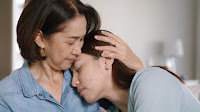
Parents and their teenage children report similar rates of anxiety and depression, according to a report published this week by Harvard Graduate School of Education’s Making Caring Common project. Further, almost 40% of teens report being worried about the mental health of at least one of their parents.
“There is a largely untold story about parent mental health in America,” the report’s lead author Richard Weissbourd, Ed.D., of the Harvard Graduate School of Education said in a news release. “Parents and teens’ mental health are deeply interwoven, and we need to do much more in this country to support parents and to promote their mental health. Parents and other primary caregivers also need the knowledge and resources to be able to support their teens’ mental health.”
Weissbourd and his colleagues conducted two surveys in December 2022. One survey was directed to teens (ages 14 to 17) and young adults (ages 18 to 25), while the other was directed to parents or caregivers. Respondents were recruited from NORC at the University of Chicago, a research organization with nationally representative panels of both adults and teens. The survey questions for teens and young adults asked the youth to identify up to two primary caregiver(s) and focused on issues such as their perceived stressors, relationships, view of their parents and schools, and their help-seeking strategies. Much of the caregiver survey directly matched the questions given to teens and young adults.
Respondents reported their anxiety and depression symptoms using the Generalized Anxiety Disorder-2 and Patient Health Questionnaire-2 measures, respectively. Respondents were considered to have anxiety or depression if they had scores of three or more, which is the score at which patients are typically screened for generalized anxiety disorder or major depressive disorder in clinical settings.
In total, 396 teens, 709 young adults, and 748 parents or caregivers responded to the survey, including 321 pairs of teens and their parents. (For the purposes of the report, the researchers categorized all female primary caregivers as “mothers” and all male primary caregivers as “fathers.”) The findings include the following:
- 18% of teens reported experiencing anxiety, as did 20% of mothers and 15% of fathers.
- 15% of teens reported experiencing depression, as did 16% of mothers and 10% of fathers.
- Teen girls reported higher rates of anxiety (24%) and depression (22%) compared with teen boys (12% and 8%, respectively).
- 40% of teens reported that they want their parents to “reach out more to ask how [they’re] really doing and to really listen.”
- Teens reporting depression and anxiety are much more likely to reach out to their friends (56%) than their parents (32%) for emotional support.
- Among the parent-teen pairs, a lack of awareness among the parents of the anxiety or depression that their teens experienced was strongly associated with depression and anxiety in both teens and parents. “The greater the misalignment, the greater the chances that both parents and teens reported these emotional challenges,” the authors wrote.
“The good news is that much is known about how to mitigate these emotional troubles in parents, how to guide parents in knowing and providing vital emotional support to their teens, how to reduce the harmful impact of parental depression and anxiety on teens, and how to head off damaging parent-teen dynamics,” the authors wrote. “But we need government agencies and community efforts at a much broader scale that support parents’ emotional health, connect parents to effective treatment, and equip them to promote their own and their children’s mental health.”
For related information, see the Psychiatric News article “Surgeon General Calls for Action to Address Youth Mental Health Crisis.”
(Image: iStock/ChayTee)
Don’t Miss Out on Free Webinars Coming Next Week
APA and Morehouse School of Medicine African American Behavioral Health Center of Excellence have joined forces to create a series of webinars and training modules on addressing mental health disparities among Black Americans. Two webinars that are part of this educational series will take place next week:
- July 18, 3 p.m. ET: Black & Blue: The Intersection of Mental Health, Policing, and Race in A Crisis Response Psychiatrist Dionne Hart, M.D., will discuss the history of policing in the United States, innovative solutions to decrease the role of police in response to a mental health crisis, and more in this hour-long interactive webinar.
- July 19, 3 p.m. ET: Technology Acceptance and the Digital Divide Telepsychiatry can extend the reach of treatment to more patients, but “technology deserts” continue to exist. In this one-hour webinar, psychiatrist Iverson Bell, M.D., will describe remedies for overcoming technology deserts and more.

